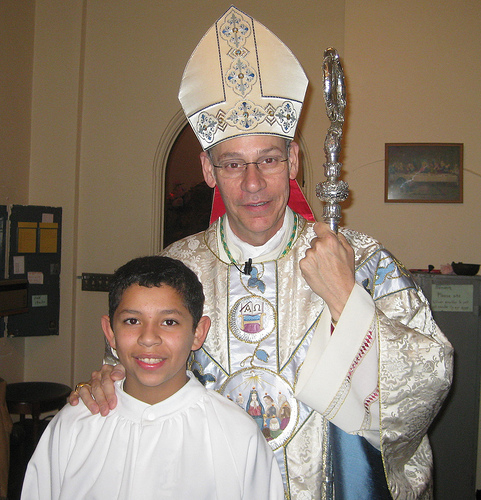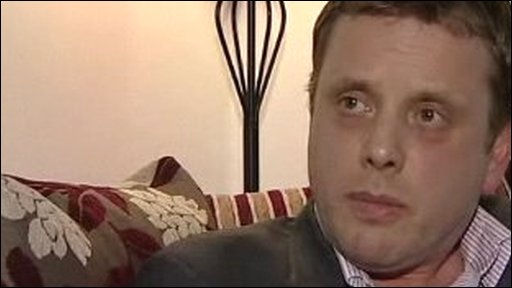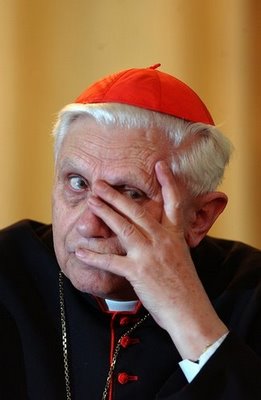A study commissioned by the Kansas City-St. Joseph diocese of its handling of sexual misconduct cases found that “individuals in positions of authority reacted to events in ways that could have jeopardized the safety of children in diocesan parishes, school, and families.”
Hiring former U.S. Attorney Todd Graves to investigate how the diocese handles cases of sexual misconduct was part of Bishop Robert Finn’s response to questions that he had mishandled the case of Fr. Shawn Ratigan, a local pastor arrested in May for possession of child pornography. 
The Graves report states that Finn, who first became aware of concerns about Ratigan in December, “had not determined a ‘breaking point’ at which he would remove Fr. Ratigan from ministry or take other more serious action.”
Ratigan is in jail on charges filed in Clay County, Mo. A federal grand jury charged him in August with 13 counts of production, attempted production and possession of child pornography.
Among the findings in the 138-page report, which is available online, are:
Diocesan leaders, as previously reported in the media, did not inform the diocesan review board of allegations;
Responsibility for the investigation of sexual misconduct fell to one office, that of the vicar general;
Finn took Ratigan at his word that he would abide by restrictions on his association with children.
Taken together, the report states, findings indicate that “Diocesan leaders failed to follow their own policies and procedures” for responding to reports of sexual misconduct.
The report appears to place most blame on the current vicar general of the diocese, Msgr. Robert Murphy, who was previously the point person in the diocese for investigating claims of sexual misconduct and was also a member of the diocesan review board.
Murphy, the report states, “served as a gatekeeper” and had “no one to second guess his judgments.”
Murphy was relieved of his responsibility in cases of sexual misconduct by clergy in June, but remains vicar general of the diocese.
Ratigan served as pastor of St. Patrick Parish in Kansas City until December. The parish is in Clay County.
For the most part, today’s report seems to affirm the sequence of events already reported by diocesan officials and in the media.
However, the report elaborates on certain aspects of the story, including how a detailed report outlining misconduct by Ratigan was handled by Murphy and Finn.
A year before Ratigan’s arrest, principal Julie Hess of the elementary school attached to St. Patrick Parish hand delivered to Murphy a letter warning that parents and staff members there were concerned about “significant red flags” about Ratigan’s behavior and were worried he “fit the profile of a child predator.”
“Parents, staff members, and parishioners are discussing his actions and whether or not he may be a child molester,” wrote Hess in the May 2010 letter.
As previously reported in the media, the report states that Murphy verbally informed Finn of the letter, but that the bishop did not read it until May 2011.
In the report, Finn states that he “cannot recall” whether he received a written report on the subject from Murphy prior to this May, and can only “specifically recall” three items from Murphy’s verbal report to him on the subject:
That Ratigan had swung children around on the school playground, had let children hug his legs and had let a girl sit on his lap.
Among other descriptions of Ratigan’s behavior in Hess’ letter are instances where the priest had allowed students to “climb on him, grab his leg/s, and reach into his pockets for candy” and a report that, during a Brownie Girl Scout visit to his home, a woman “had found a pair of girls’ panties inside one of the planters in Father’s back yard.”
The letter concludes: “[Staff members] believe that Father spends so much time at school he isn’t able to get other important things done. Father is at school every day for long periods of time. He is usually present at arrival time, during morning prayer, recess, lunch, dismissal, and after school. He also visits the early childhood center most every day.”
Also elaborated upon in today’s report is the process by which Finn dealt with instances of Ratigan visiting children after he had been removed from his parish.
After receiving out-of-state treatment for a December suicide attempt, Ratigan was assigned by Finn to live with a group of Vincentian priests in a home located near a prayer center run by a group of Franciscan sisters.
As previously reported, today’s report states that, when moving Ratigan, Finn gave the priest instructions to not attend or participate in events where children were present, to not have access to a computer, and to only use cameras in “limited circumstances.”
However, the report states, there was no supervision given to Ratigan to ensure those instructions were followed.
In a sub-section titled “A Flag of the Reddest Color,” the report states that Ratigan attended several functions where children were present in March, including a popular local parade.
News of Ratigan’s visit with children, the report states, caused Msgr. Brad Offutt, the chancellor of the diocese, to e-mail Finn April 8 expressing concern.
“I am not sure what the options are for addressing this, but plainly something needs to be done to limit Diocesan liability and protect children,” wrote Offutt. “[Ratigan’s] recent behavior relative to children and on the computer are a flag of the reddest color”
During a conversation the same day with Ratigan, the report states, Finn admonished the priest, again, that he was not to have contact with children.
Ratigan, the report states, heard confessions from minors April 11 and “grew bolder” by attending a high school track meet May 7 and accessing the guest computers at the Vincentian home.
Finn, the report states, said in an interview for the investigation that he “had not formulated a plan” to address Ratigan’s behavior.
“Although he was considering assigning Fr. Ratigan to the Archives Department of the Chancery, where he would not have contact with children, Bishop Finn had not determined a ‘breaking point’ at which he would remove Fr. Ratigan from ministry or take other more serious remedial action,” the report states.
The report outlines five recommendations for the diocese, including:
Asking all diocesan employees and volunteers to report abuse to the police;
Notifying a diocesan ombudsman of current and past abuse;
Ensuring that the diocesan review board be notified of all allegations of abuse.
The diocese previously announced June 30 the appointment of an ombudsman and public liaison officer tasked with receiving and investigating cases of sexual misconduct.
In a statement to press, Graves indicated he thought the diocese would take his recommendations to heart.
“Our investigation identified shortcomings, inaction and confusing procedures, but we believe Bishop Finn and the leadership of the diocese understand the gravity of the issues and take these recommendations seriously,” Graves stated.
In a similar statement, Finn touted the diocese’s appointment of the ombudsman as a sign its seriousness.
“The Graves report affirms the decision to establish and appoint an Ombudsman. Jennifer Valenti, appointed Ombudsman in late June, is an experienced prosecutor and possesses the authority as gatekeeper to receive and investigate, independently, any complaint involving the sexual abuse of minors,” Finn stated.
A statement from the Survivors Network of Those Abused by Priests was more skeptical.
“Lawyers still act like adding some phrases to the official diocesan procedure manual will make some kind of difference,” SNAP’s outreach director Barbara Dorris wrote.
“It won’t. Only vigorous action by police and prosecutors will make kids safer in the KC diocese.”
http://tinyurl.com/4yy5utd





